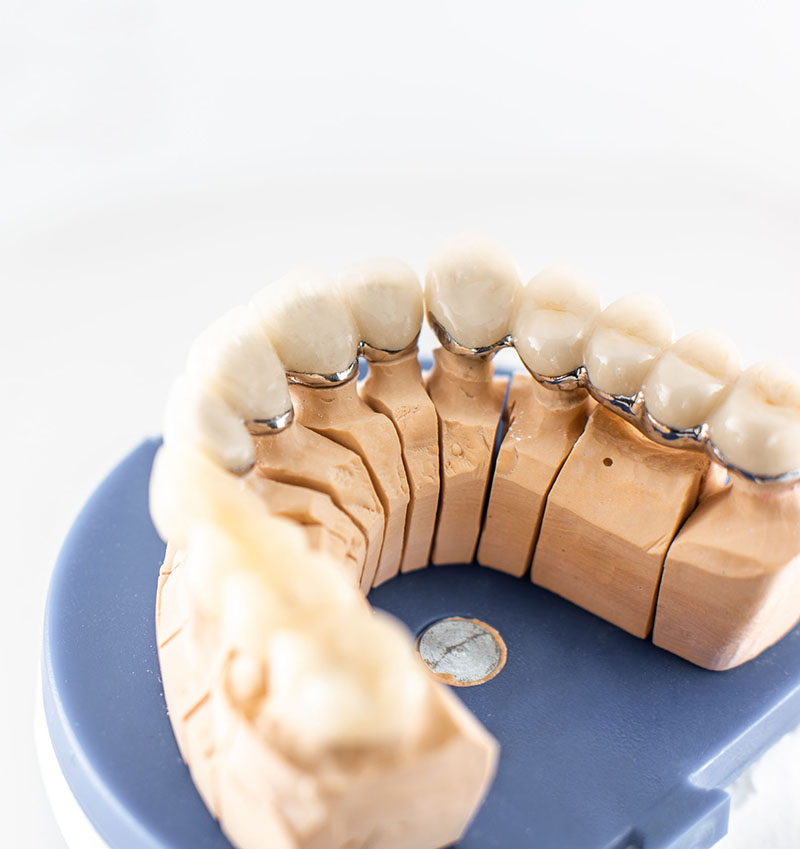
Novelty
In the Smile
Dental Crowns
A crown is a full-coverage restoration that is cemented onto the crown portion of your existing tooth. And for that dental crown to fit over the tooth, the existing tooth needs to be prepared or trimmed first. Then the dentist obtains a clear and concise mold of the prepared tooth or teeth before sending them to the laboratory for actual crown fabrication.
This procedure is applicable for severely damaged and decayed teeth where a dental filling may not be enough to strengthen and sustain the purpose of successfully restoring the tooth. Dental crowns are the ultimate restoration for Root Canal Treated tooth because they turned out brittle and can crack if not properly fixed. In addition, a dental crown can be utilized to enhance the size, appearance, and color of teeth in case of broken, abraded, discolored, stained, malposed, and misshaped teeth.
Dental Crowns (“dental caps“) can be crafted of various materials. Our dentists will inform you on what material is best suited for your specific situation.
Skillfully Crafted Dental Crowns

Types of Crowns
Full Metal Crown
they are rarely used for aesthetic consideration. They are widely used a long time ago when dentists do not commonly offer porcelain material in dental practices before. They can still be used on the back-most area of the mouth where they cannot be seen or blocked by other teeth and dentures.
Metal Crown

Porcelain-Fused-to-Metal Crowns (PFM)

Porcelain Fused to Metal Crown (PFM)
the most commonly used crown in dentistry. PFM is formed by a consolidation of tooth-colored porcelain material put on top of non-precious (ordinary) metal or semi-precious metal (example: “Tilite“).
Both these components are fused, so the porcelain is visible outward, and the metal makes up the inner part for support. This option is suitable and produces an aesthetically pleasing outcome, with superior strength and sturdy support.
a.) Non-precious (ordinary) metal — compared to semi-precious metal types, they are vastly favored due to affordability. But they should be replaced soon if gums recede or if the neck area of the teeth begins to show. Exposed teeth within the crown can start teeth becoming sensitive and can favor decay formation underway.
b.) Tilite (semi-precious) metal — is highly favored due to biocompatibility issues, deficient in the ordinary/non-precious metal type. In addition, the semi-precious metal is gum-friendly and lasts longer if done correctly.
One disadvantage of PFM is that they produce a greyish effect near the gum line, which is noticeable and obvious when one smiles. And because the metal component blocks light, they do not have the same transparency as natural teeth.
Ceramic Crowns
this type of dental crowns are used depending on the type of ceramic material suggested in a particular case and the budget consideration.
For example, in deciding on a type of ceramic crown to use, we will consider if the strength and hardness are considered, or the aesthetic issue is favored. Our dentists can suggest what is the best to use in your case or situation.
Designing and choosing the ceramic used is essential; that is why we trust and continue to work with dental technicians who have served us for many years. This allows for smooth workflow and better communication. In addition, they better understand the clinical outcome we want to provide us with the best possible result.
Common types of Ceramic Crowns offered:
a.) Emax Crowns – tooth-colored and are can be shade-matched with adjacent teeth. Despite being indistinguishable from natural teeth beside it, they are advised on the front area alone or where the bite is not intense. If the bite is not adjusted correctly adjusted or if subjected to stressful chewing (in the molar region), there is a tendency for them to crack.
b.) Zirconia Crowns — are ceramic crowns that provide excellent aesthetics and are almost indistinguishable from your natural teeth. The essential difference with Zirconia lies in its strength. Zirconia is tough and rigid, giving your crown a high degree of power, allowing for heavier chewing and endurance in your mouth. Despite its hardness, it is safe and has been used outstandingly in dentistry. It has many used in both aesthetic and functional dental treatments. As a result, it is the leading and most well-liked choice for dental crown material today.
Zirconia Crowns

Ceramic Crowns

Advantages
Dental Crowns can be made more aesthetically pleasing. For them to appear natural, we can blend them with your existing teeth’ actual color.
The dental crown procedure is commonly done at Smile More Dental Clinic – Manila, as we efficiently did numerous successful cases. So, the process is done in order, with the utmost attention on patients’ comfort.
Costs and Insurance
HMO’s do not cover dental Crowns, but some international insurance partly covers the cost.
Since this type of tooth restoration is more permanent, they cost much higher compared to dental fillings. However, because the way they are done is highly technical and skill-based, the cost among dental practices is not the same.

Experience

Procedural Accuracy
The dentist must take the precise imprint of the tooth for the dental technician to fabricate a well-fitted dental crown. Therefore, any discrepancy in the process or giving a low rate or cost-cut materials will affect the longevity issue.

No Cutting of Corners

Reliable Dental Technician


